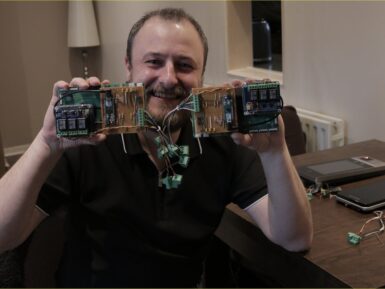
Arduino MKR Relay Proto Shield
Overview
The MKR Relay Protoshield allows you to easily add relays to your MKR board based project.
The shield provides two relays (Datasheet) called RELAY1 and RELAY2 commanded by pin 1 and pin 2 respectively.
The shield also provides an easy connection by means of screw terminal blocks to A1 to A4 analog inputs, I2C and supply voltages.
- Operating voltage 3.3V (supplied from the host board)
- Two relays with NO, COM and NC connections
- Works with battery powered board
- 8 positions screw terminal blocks for easy connections with A1 to A4 Analog input, SCL SDA for I2C, GND and 3.3V output
- 6 positions screw terminal blocks (NO, COM, NC for each relay)
- Carry current: 2 A
- Max. operating voltage: 24 VAC, 50 VDC
- Max. operating current: 1 A
- Max. switching capacity: 62.50 VA, 30W
- Proto area
You can find here your board warranty information.
Need Help?
- On the Software on the Forum
- On Projects on the Forum
- On the Product itself through our Customer Support
Conformities
Resources for Safety and Products
Manufacturer Information
The production information includes the address and related details of the product manufacturer.
Arduino S.r.l.
Via Andrea Appiani, 25
Monza, MB, IT, 20900
https://www.arduino.cc/
Responsible Person in the EU
An EU-based economic operator who ensures the product's compliance with the required regulations.
Arduino S.r.l.
Via Andrea Appiani, 25
Monza, MB, IT, 20900
Phone: +39 0113157477
Email: support@arduino.cc
Documentation
OSH: Schematics
MKR Relay Proto Shield is open-source hardware! You can build your own board using the following files:
Learn more
Get Inspired
trying to understand how to convert serial data to digital data onb arduino micro

Whether granting access to public transit or restricting unauthorized personnel in buildings, NFC card readers can be extremely useful. Although most might not consider how they work – and simply happy getting through a turnstile – there’s a lot going on behind the scenes. In his video, Daniel Raines shows off a pair of prototype access control units (ACUs) that he’s constructed. The two networked devices are each based on a Raspberry Pi Compute Module 4 along with an Arduino Micro that controls six relays to allow or deny entry, provide feedback, fire, and lock up. More details on the project can be found in Raines' clip below.








